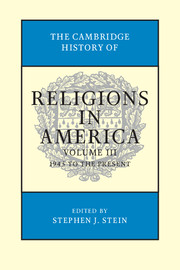Book contents
- Frontmatter
- SECTION I THE POSTWAR RELIGIOUS WORLD, 1945 AND FOLLOWING
- SECTION II CONTROVERSIAL ISSUES IN TRANSITIONAL TIMES
- SECTION III THE WORLD’s RELIGIONS IN AMERICA
- 14 Interrogating the Judeo-Christian Tradition: Will Herberg’s Construction of American Religion, Religious Pluralism, and the Problem of Inclusion
- 15 American Buddhism since 1965
- 16 Hinduism in America
- 17 Islam in America
- 18 Native American Religious Traditions Post–World War II to the Present
- 19 Latina/o Borderland Religions
- 20 New Religious Movements in America
- SECTION IV RELIGIOUS AND CULTURAL CONFLICT IN AMERICA
- SECTION V NEW AND CONTINUING RELIGIOUS REALITIES IN AMERICA
- SECTION VI CONCLUDING ESSAYS
- Index
- References
20 - New Religious Movements in America
from SECTION III - THE WORLD’s RELIGIONS IN AMERICA
Published online by Cambridge University Press: 28 July 2012
- Frontmatter
- SECTION I THE POSTWAR RELIGIOUS WORLD, 1945 AND FOLLOWING
- SECTION II CONTROVERSIAL ISSUES IN TRANSITIONAL TIMES
- SECTION III THE WORLD’s RELIGIONS IN AMERICA
- 14 Interrogating the Judeo-Christian Tradition: Will Herberg’s Construction of American Religion, Religious Pluralism, and the Problem of Inclusion
- 15 American Buddhism since 1965
- 16 Hinduism in America
- 17 Islam in America
- 18 Native American Religious Traditions Post–World War II to the Present
- 19 Latina/o Borderland Religions
- 20 New Religious Movements in America
- SECTION IV RELIGIOUS AND CULTURAL CONFLICT IN AMERICA
- SECTION V NEW AND CONTINUING RELIGIOUS REALITIES IN AMERICA
- SECTION VI CONCLUDING ESSAYS
- Index
- References
Summary
Through the last decades of the twentieth century, Americans became aware of a bewildering array of new and unfamiliar religious groups that had taken up residency in the country. The heightened level of diversity and the country’s tolerance of minority, unusual, and even questionable forms of religiosity were accompanied by a public controversy concerning the legitimacy of some of these religious groups, which were charged with recruiting members using psychological techniques that subverted free will. Amid the controversy, following several incidents of violence, the new religions tested the limits of what the public would countenance under the guarantees of religious freedom and what legal authorities would countenance under their broad definitions of “religion.”
By the end of the century, as the dust settled on the public controversy over brainwashing and mind control in questionable religious groups, the scholarly community had become aware that North America had become the home to some two thousand different religious communities that represented the broad spectrum of the world’s religions. Even as words of alarm spread over the new American pluralism, however, the dominant Christian community grew spectacularly, almost doubling in size through the last half of the twentieth century. About half of the two thousand religious groups in America were simply variants of familiar Christian denominations.
- Type
- Chapter
- Information
- The Cambridge History of Religions in America , pp. 426 - 450Publisher: Cambridge University PressPrint publication year: 2009



